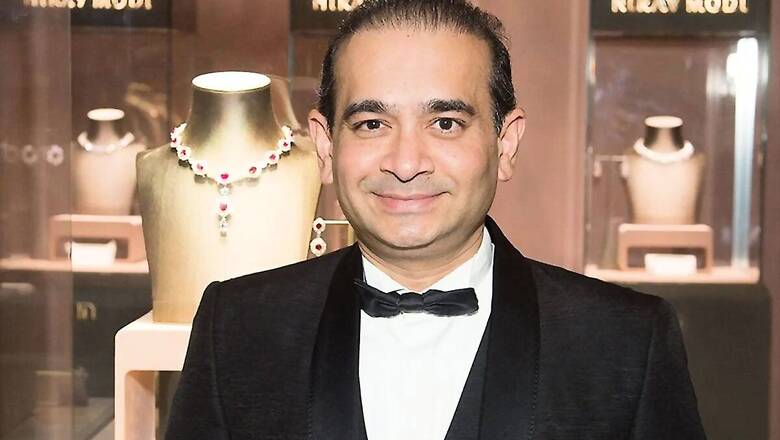
views
In a comprehensive win for the Indian authorities, a UK judge ruled on Thursday that fugitive diamond merchant Nirav Modi not only has a case to answer in the Indian courts but that there is no evidence to suggest he would not receive a fair trial in India. Nirav Modi, wanted in India on charges of fraud and money laundering in the estimated USD 2-billion Punjab National Bank (PNB) scam case, lost his legal battle against extradition on all grounds as District Judge Samuel Goozee also concluded that there are no human rights concerns that his medical needs would not be addressed as per several Indian government assurances.
The 49-year-old appeared via videolink from Wandsworth Prison in south-west London, dressed in a formal suit and sporting a thick beard, and showed no emotion as excerpts of the judgment were read out in court. “I am satisfied that there is evidence upon which NDM [Nirav Deepak Modi] could be convicted in relation the conspiracy to defraud the PNB. A prima face case is established, the judge said.
He similarly concludes a prima facie case to have been established on all counts of charges brought by the Central Bureau of Investigation (CBI) and Enforcement Directorate (ED) money laundering, intimidation of witnesses and disappearance of evidence. “I am not required to exclude all Mr Modi’s various alternative theoretical possibilities and narratives; nor exclude his personal interpretation of the evidence, in order to find a prima face case has been established, the judge noted, referring to the extradition case of former Kingfisher Airlines boss Vijay Mallya as precedent.
He accepted that while Nirav’s mental health had deteriorated due to the lengthy incarceration in a London prison, excerbated by the Covid-19 pandemic, his risk of suicide does not meet the high threshold to satisfy him that his mental state is such that it would be “unjust or oppressive” to extradite him. Under the UK Extradition Act 2003, the judge will now send his findings to the Secretary of State for Home Affairs, Priti Patel. It is the UK Cabinet minister who is authorised to order an extradition under the India-UK Extradition Treaty and has two months within which to make that decision. The Home Secretary’s order rarely goes against the court’s conclusions, as she has to consider only some very narrow bars to extradition which are unlikely to apply in this case, including the possible imposition of a death penalty.
Whatever the ministerial decision, the losing side Nirav Modi has up to 14 days within which to approach the High Court and seek leave to appeal after the Home Secretary has made her decision known. Nirav’s legal team did not immediately confirm if he intends to appeal against Thursday’s ruling. Any appeal, if granted, will be heard at the Administrative Division of the High Court in London. Nirav Modi, meanwhile, remains on remand at Wandsworth Prison until the Home Secretary’s decision to sign off on the extradition order.
He was arrested on an extradition warrant on March 19, 2019, and has appeared via video link from Wandsworth Prison for a series of court hearings in the extradition case. His multiple attempts at seeking bail have been repeatedly turned down, both at the Magistrates’ and High Court level, as he was deemed a flight risk. Nirav is the subject of two sets of criminal proceedings, with CBI case relating to a large-scale fraud upon PNB through the fraudulent obtaining of letters of undertaking (LoUs) or loan agreements, and the ED case relating to the laundering of the proceeds of that fraud. He also faces two additional charges of “causing the disappearance of evidence” and intimidating witnesses or criminal intimidation to cause death, which were added on to the CBI case.
Read all the Latest News, Breaking News and Coronavirus News here
















Comments
0 comment